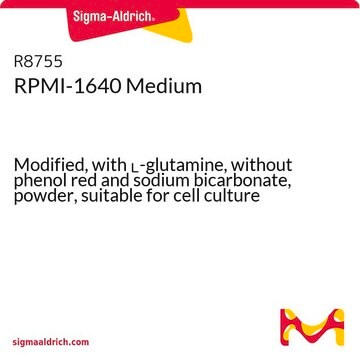추천 제품
제품명
RPMI-1640 Medium, With L-glutamine, without glucose and sodium bicarbonate, powder, suitable for cell culture
양식
powder
기술
cell culture | mammalian: suitable
성분
L-glutamine: yes
phenol red: yes
sodium pyruvate: no
HEPES: no
NaHCO3: no
배송 상태
ambient
저장 온도
2-8°C
유사한 제품을 찾으십니까? 방문 제품 비교 안내
일반 설명
RPMI 1640 Medium was developed at Roswell Park Memorial Institute in 1966 by Moore and his co-workers. A modification of McCoy′s 5A Medium, it was formulated to support lymphoblastoid cells in suspension culture, but it has since been shown to support a wide variety of cells that are anchorage-dependent. Originally intended to be used with a serum supplement, RPMI 1640 has been shown to support several cell lines in the absence of serum. It has also been widely used in fusion protocols and in the growth of hybrid cells. This medium is suitable for culturing human normal and neoplastic leukocytes.
애플리케이션
RPMI-1640 Medium has been used as a cell culture medium to culture human MCF-7 breast cancer cells and human castrate-resistant prostate cancer (CRPC) cell lines for various cell culture experiments. It has also been used to culture human islets to assess the oxidative stress response in primary human islets.
수량
Formulated to contain 8.4 grams of powder per liter of medium.
재구성
Supplement with 2.0 g/L sodium bicarbonate.
또한 이 제품과 함께 일반적으로 구입
제품 번호
설명
가격
보충제
제품 번호
설명
가격
Storage Class Code
13 - Non Combustible Solids
WGK
WGK 1
Flash Point (°F)
Not applicable
Flash Point (°C)
Not applicable
가장 최신 버전 중 하나를 선택하세요:
시험 성적서(COA)
Lot/Batch Number
이미 열람한 고객
Jiayi Yao et al.
Cancers, 12(8) (2020-08-09)
The acidic pH of the tumor microenvironment plays a critical role in driving cancer development toward a more aggressive phenotype, but the underlying mechanisms are unclear. To this end, phenotypic and genotypic changes induced by adaptation of cancer cells to
Renée J H A Tillie et al.
Frontiers in cell and developmental biology, 9, 695684-695684 (2021-08-31)
The protein 6-phosphofructo-2-kinase/fructose-2,6-bisphosphatase-3 (PFKFB3) is a key stimulator of glycolytic flux. Systemic, partial PFKFB3 inhibition previously decreased total plaque burden and increased plaque stability. However, it is unclear which cell type conferred these positive effects. Myeloid cells play an important
Qinxi Ma et al.
mSphere, 4(3) (2019-06-28)
Fatty acids have known antifungal effects and are used in over-the-counter topical treatments. Screening of a collection of gene knockouts in Candida albicans revealed that one strain, carrying a deletion of the transcription factor DAL81, is very susceptible to the
Mette Flinck et al.
Cell cycle (Georgetown, Tex.), 17(9), 1056-1067 (2018-06-14)
Precise acid-base homeostasis is essential for maintaining normal cell proliferation and growth. Conversely, dysregulated acid-base homeostasis, with increased acid extrusion and marked extracellular acidification, is an enabling feature of solid tumors, yet the mechanisms through which intra- and extracellular pH
Mark Y Jeng et al.
The Journal of experimental medicine, 215(1), 51-62 (2017-12-02)
The expansion of CD8+CD28- T cells, a population of terminally differentiated memory T cells, is one of the most consistent immunological changes in humans during aging. CD8+CD28- T cells are highly cytotoxic, and their frequency is linked to many age-related
자사의 과학자팀은 생명 과학, 재료 과학, 화학 합성, 크로마토그래피, 분석 및 기타 많은 영역을 포함한 모든 과학 분야에 경험이 있습니다..
고객지원팀으로 연락바랍니다.




